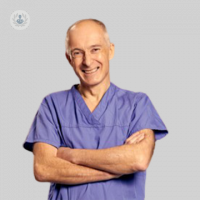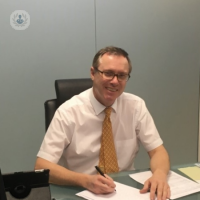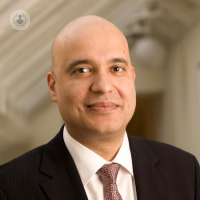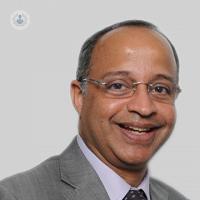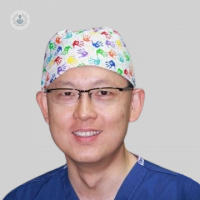What are voice disorders?
Voice disorders are medical conditions which affect the sounds that depend on the larynx (vocal cords), the pitch, volume, tone and other qualities of the voice. Voice disorders, therefore, affect speech production.
Your vocal cords are made of muscle, mucous membranes, and cartilage. Vocal cords are located at the top of your windpipe (trachea) and below your tongue. If they become inflamed, develop growths or become paralyzed they can’t work properly and this could mean you might develop a voice disorder.
The origin of such changes can be organic, physiological, psychological or environmental. There are also two types of disorders: dysphonia and aphonia.
Aphonia is the total loss of voice, whether temporary or chronic and can be caused by overuse of the vocal cords, a respiratory disease, intake of toxic or irritating products, excessive cold or nervous causes. Treatment may include resting the voice, medication, voice therapy or, in severe cases, surgery.
Dysphonia is a disorder of voice intensity due to an injury in the organs or poor use of the voice (functional). The most common causes of this condition are overly straining your voice (voice hyperfunction), gastroesophageal reflux, smoking, infections such as laryngitis or tuberculosis, neurological disorders of the larynx, tumours, and trauma, among others. The treatment involves learning relaxation techniques and breathing, exercising the shoulder, neck and face muscles, and speech therapy.
If you feel you have signs and symptoms of a voice disorder, it is advised to speak with an Otolaryngologist who will be able to diagnose and treat you.

What are some risk factors that can contribute to a voice disorder?
- Ageing
- Alcohol consumption
- Allergies
- Gastroesophageal reflux disease
- Illnesses such as upper respiratory infections or colds
- Neurological disorders
- Trauma at the front of the neck or from neck surgery
- Screaming
- Stress
- Smoking
- Throat dehydration
- Thyroid problems
- Voice overuse or misuse
What are the signs that you may have a voice disorder?
- Your voice has become hoarse or raspy
- You've lost the ability to hit some high notes when singing
- Your voice sounds deeper than usual
- Your throat often feels achy, raw, or strained
- It's become an effort to talk
How can voice disorders be treated?
Treatment for voice disorders varies depending on the cause. Most voice problems can be successfully treated when diagnosed early.
Treatment will depend on the factors causing your voice disorder, however, they can include medication, voice therapy, injections or even surgery.
11-13-2012 07-26-2023
Voice disorders
Professor Martin Anthony Birchall - Otolaryngology / ENT
Created on: 11-13-2012
Updated on: 07-26-2023
Edited by: Kate Forristal
What are voice disorders?
Voice disorders are medical conditions which affect the sounds that depend on the larynx (vocal cords), the pitch, volume, tone and other qualities of the voice. Voice disorders, therefore, affect speech production.
Your vocal cords are made of muscle, mucous membranes, and cartilage. Vocal cords are located at the top of your windpipe (trachea) and below your tongue. If they become inflamed, develop growths or become paralyzed they can’t work properly and this could mean you might develop a voice disorder.
The origin of such changes can be organic, physiological, psychological or environmental. There are also two types of disorders: dysphonia and aphonia.
Aphonia is the total loss of voice, whether temporary or chronic and can be caused by overuse of the vocal cords, a respiratory disease, intake of toxic or irritating products, excessive cold or nervous causes. Treatment may include resting the voice, medication, voice therapy or, in severe cases, surgery.
Dysphonia is a disorder of voice intensity due to an injury in the organs or poor use of the voice (functional). The most common causes of this condition are overly straining your voice (voice hyperfunction), gastroesophageal reflux, smoking, infections such as laryngitis or tuberculosis, neurological disorders of the larynx, tumours, and trauma, among others. The treatment involves learning relaxation techniques and breathing, exercising the shoulder, neck and face muscles, and speech therapy.
If you feel you have signs and symptoms of a voice disorder, it is advised to speak with an Otolaryngologist who will be able to diagnose and treat you.

What are some risk factors that can contribute to a voice disorder?
- Ageing
- Alcohol consumption
- Allergies
- Gastroesophageal reflux disease
- Illnesses such as upper respiratory infections or colds
- Neurological disorders
- Trauma at the front of the neck or from neck surgery
- Screaming
- Stress
- Smoking
- Throat dehydration
- Thyroid problems
- Voice overuse or misuse
What are the signs that you may have a voice disorder?
- Your voice has become hoarse or raspy
- You've lost the ability to hit some high notes when singing
- Your voice sounds deeper than usual
- Your throat often feels achy, raw, or strained
- It's become an effort to talk
How can voice disorders be treated?
Treatment for voice disorders varies depending on the cause. Most voice problems can be successfully treated when diagnosed early.
Treatment will depend on the factors causing your voice disorder, however, they can include medication, voice therapy, injections or even surgery.


Get your voice back: Taking care of voice problems
By Mr Julian McGlashan
2025-01-15
While issues with the pitch, volume or tone of voice are not uncommon, voice problems can be troublesome for many people. Mr Julian McGlashan, leading consultant ENT surgeon with expertise in voice and throat disorders - including those of professional voice users - explains how voice problems can be self-managed and when specialist help should be sought. See more


Voice disorders: Exploring causes and treatments
By Mr Michael Kuo
2025-01-15
Voice disorders can have a significant impact on daily life and interpersonal communication. From hoarseness and vocal fatigue to complete loss of voice, voice disorders encompass a wide range of conditions that affect people of all ages. Here, Mr Michael Kuo, renowned consultant ENT surgeon, provides an expert insight into the world of voice disorders, exploring their causes, diagnosis, and treatment options. See more


Voice changes after thyroid surgery: Does thyroid hoarseness go away?
By Mr Radu Mihai
2025-01-15
After thyroid surgery, your voice could change for several reasons. In some cases, voice changes are temporary and in other cases, they are permanent. Does thyroid hoarseness go away? Mr Radu Mihai provides you with an in-depth guide on the potential voice changes you may experience, what can cause them and much more. See more


How long can a voice disorder last?
By Mr Nick Hamilton
2025-01-15
Have you been suffering from hoarseness recently? If so, you may have developed a voice disorder. Here to detail what a voice disorder is, what the potential cause of it may be, and how it can be treated, is revered consultant ENT surgeon, Mr Nick Hamilton. See more
Experts in Voice disorders
-
Mr Nicholas Eynon-Lewis
Otolaryngology / ENTExpert in:
- Blocked nose
- Vertigo
- Voice disorders
- Tinnitus
- Sinusitis
- Septorhinoplasty
-
Professor Guri Sandhu
Otolaryngology / ENTExpert in:
- Voice disorders
- Tracheostomy
- Dysphagia
- Paediatric ENT
- Sleep apnoea
- Hoarseness
-
Mr Abhijeet Parikh
Otolaryngology / ENTExpert in:
- Hearing loss
- Otosclerosis
- Cholesteatoma
- Rhinitis
- Nasal polyps
- Voice disorders
-
Mr Jonathan Hughes
Otolaryngology / ENTExpert in:
- Voice disorders
- Head and neck cancer
- Neck lump
- Sinusitis
- Thyroid gland surgery
- Sleep apnoea
-
Mr Michael Kuo
Otolaryngology / ENTExpert in:
- Paediatric ENT
- Hearing loss
- Voice disorders
- Blocked nose
- Sleep apnoea
- Neck lump
- See all

Consult-ENT
Consult-ENT
BMI Chaucer Hospital, Nackington Rd, Canterbury, CT4 7AR
No existe teléfono en el centro.
By using the telephone number provided by TOP DOCTORS, you automatically agree to let us use your phone number for statistical and commercial purposes. For further information, read our Privacy Policy
Top Doctors

The Harley Street Clinic - part of HCA Healthcare
The Harley Street Clinic - part of HCA Healthcare
35 Weymouth Street, London. W1G 8BJ
No existe teléfono en el centro.
By using the telephone number provided by TOP DOCTORS, you automatically agree to let us use your phone number for statistical and commercial purposes. For further information, read our Privacy Policy
Top Doctors

Beaumont Hospital - part of Circle Health Group
Beaumont Hospital - part of Circle Health Group
Old Hall Clough, Chorley New Rd, Lostock, BL6 4LA
No existe teléfono en el centro.
By using the telephone number provided by TOP DOCTORS, you automatically agree to let us use your phone number for statistical and commercial purposes. For further information, read our Privacy Policy
Top Doctors
-
Consult-ENT
BMI Chaucer Hospital, Nackington Rd, Canterbury, CT4 7AR, CanterburyExpert in:
- Voice disorders
- Blocked nose
- Ear infection
- Dizziness
- Paediatrics
- Hearing loss
-
The Harley Street Clinic - part of HCA Healthcare
35 Weymouth Street, London. W1G 8BJ, Central LondonExpert in:
- Cancer
- Head and neck cancer
- Cardiology
- Intensive care
- Diagnostic Imaging
- Women’s health
-
Beaumont Hospital - part of Circle Health Group
Old Hall Clough, Chorley New Rd, Lostock, BL6 4LA, BoltonExpert in:
- Audiology
- General Surgery
- Orthopaedic surgery
- Dermatology
- Pain management
- Hernia
- Most viewed diseases, medical tests, and treatments
- HHT (Hereditary Haemorrhagic Telangiectasia)
- Snoring
- Polysomnography (sleep study)
- Nystagmus
- Hormone therapy
- Migraine
- Autoimmune diseases
- Weight loss injections
- Nipple discharge
- Abdominal pain
